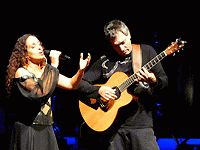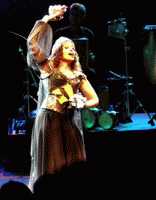AVIVA-Berlin >
Jüdisches Leben > Juedinnen
AVIVA-BERLIN.de 8/17/5785 -
Beitrag vom 12.12.2008

Interview with Achinoam Nini - NOA
Margret Mû¥ller
AVIVA-Berlin talked with Noa about home, ambivalent Israeliness, peace activism, power-failures and Leonard Cohen as a mantra source for inner power and letting go the pursuit for perfection.
Copyright Pictures: Sylvia van der Woude
AVIVA-Berlin: You were born with Yemenite origin in Israel, grew up in New York and studied as a secular child in a Yeshiva (religious school). What meaning has the word "home" for you?
Noa: Well, home is Israel. Now. But it has been for a long time. I chose Israel as my home when I was 17 years old and I have not replaced it with any other home. I do not have a house anywhere else. I have my husband, children and a house with a studio. But I feel at home at many other places. I feel at home at New York when I go there, because obviously it is my hometown. I feel at home in many European countries where I have performed for many years and where I have made a lot of friends. But the place where I put my flag in the ground is definitely Israel.
AVIVA-Berlin: Watching Israeli interviews it seems that you are very loved on one hand but also watched more critically than abroad. You also said that in Israel you "have to earn your bread harder" than in other countries. Do you feel you need to defend your "Israeliness"?
Noa: Yes, sometimes I do. And the funny thing is that it goes both ways. In Israel I have to defend my Israeliness because I did not grow up in Israel. English is my first language, I write in English and mostly read English. That is the first hard part. And then, since I started travelling around the world, having my career mostly outside of Israel is sometimes difficult for people in Israel to understand or accept. Many people are very proud of it, or think that it is great. But then they do not feel that you are theirs. You belong to something out there. So there is always this sought of tug of war between "you are out, we are proud, we love you." and "but you are not here, you are far away." We are working on our relationship. Israel and me need to go to a shrink together.
On the other side, outside of Israel, of course I am Israeli. Then I have to answer all the questions people have about Israel. Which are sometimes difficult questions. I become a politician, embassador, diplomate and everything. And I am expected to give answers for everything my country does even things that I do not understand myself or do not agree with. So it is difficult on both sides. That would not stop me from presenting myself as Israeli, because it would be dishonest to do otherwise. I am happy to be Israeli.
And one of the beautiful things about Israel is that it is a young country and a free democracy. You can live in Israel and fight for things you believe in. There is still room for change in Israel. The bottle is not closed yet. You can turn things in positive ways. And we do that. We are involved in all kind of positive projects that we feel can have a positive influence on the way Israel defines its identity. That is one of the reasons why love and choose living in Israel.
AVIVA-Berlin: As you said, abroad every Israeli becomes some kind of an embassador of his homecountry. What would you want people to know about Israel?
Noa: First of all, that Israel is a modern and free democratic state, beyond being a beautiful country for its history and cultural depth and diversity. And like every country it has a range of different things. There are free thinkers and conservative, left- and right-winged people, all kind of different movements, as in every country. Some people have strange ideas about Israel. They think maybe we are living under bombshelters or maybe we are still riding camels and wearing bukhas. This has nothing to do with the truth. There are minorities of all types in Israel but the great majority is secular, democratic and free. Being as such I would also mention to say that the large majority is very drawn to peace. The arguments are normally about the right way to achieve that. It is not whether or not we want peace. Everyone wants peace. And this is right for the other side as well, I am sure. I do not live there, but I am positive.
And you add to that a lot of complicated elements. Religion is always something that is stopping us from our goals of progress and peace. And I am not saying this only for Jews, but also for all the countries around us, Muslims and Christians. Religion is a non-rational entity, because it relies on a lot of indoctrination and dogma. It is not favorable to compromise, dialog and change, which is what we need in order to achieve peace. Religion is a big problem, from my personal opinion.
History. Our history does not help us, we have a very bloody history and there is a great deal of fear and suspicion on both sides. That is something we have to work on, that is why I said we need a shrink.
But I think all those things are overcomable. I think we can overcome all those things with a little bit of courage. And I think we will find a solution. I do not know what will happen on the way. I hope it will not be another war. But it might be and that is very sad for me.
Another important thing is that many people are not aware of the amount of peace activities in Israel because it is very seldom portrayed in the media. Media would normally tend to portray the more violent struggle, sensational, photogenic things. They do not spend a lot of time dwelling on all the small people doing good deeds every day, trying to reach out to each other within each country and over the border. We are exposed to endless amount of activities, such as this we have also supported whether by singing for it or helping raise money or speaking out in favor of all these organisations in Israel and in Europe. And it is sometimes sad for me to see how little people are aware of the underground activities that happen all the time. Because this kind of information can be hope, and hope has a dynamic of its own. That is a message I want to convey very clearly, that all is not lost.
|  |
Noa and Gil Dor |
AVIVA-Berlin: You also just became members of
the Online network "Ipeace". There you said, that after performing at the 4th of November 1995 when Yitzhak Rabin was assassinated you came away from that dreadful night as a changed woman. What has changed for you?
Noa: I was shocked. Like the entire country, I could not believe that something like this could happen in Israel. It was a bit of a bubble that burst. We had this vision of ourselves, being different from others, that this thing could not happen to us. There was this crazy guy that shot John F. Kennedy, or the one that shot John Lennon. And there was now one crazy right-winged man that shot Rabin. And shooting not only a man but an incredible idea for a lot of us. And suddenly there was horrible brother-killing. After Jews having suffered so much over the history ã needless to say that in Germany ã we have this bubble of "Jews for Jews", we stick to each other, we help each other. Our come-together is what will make us survive. And then seeing one Jew killing another Jew in this way, so brutal and public was just shocking. And the second thing is that there are really people who do not want peace. And they are even willing to kill for it and do it under the name of God. God sent them to do that. And I felt that if those powers exist then I have to counter them. Somebody has to be on the other side, raise the voice, raise my voice, ideas and message.
I felt there was a much greater importance to speaking out for peace, working for peace, pulling myself forward and not hiding behind being a musicianãÎ That was not the time in history to be hiding.
AVIVA-Berlin: So it was actually an impulse to become more active.
Noa: Yes it was an incident to put myself even more prominently on this forefront of peace movement which I have been doing ever since.
AVIVA-Berlin: You said on your
DVD (Noa and the Solis string quartet live in Israel), that before a concert you are "at the edge, about to fly". What are you doing before a concert?
Noa: I am not a person that has a lot of stage-fright. I am very comfortable on stage,
I fly, feel like a bird. That does not mean that I am not very nervous, because I want things to go very well and I am a perfectionist and very concentrated. I am not that kind of person who will sit around and joke with the people and drink wine before the show. No.
Before the show I am twisted like a string ready to explode. I take what I do very seriously, it is not just a job. Although it is fun, I do not do it for fun. It is much more intense and one of the most important things in my life and I treat it like that.
|  |
Yemenite wedding dance in concert |
AVIVA-Berlin: Once an Israeli newspaper published a calendar of one week of yours. It is very impressive: international music star, peace activist, mother and wife. What gives you the power for all this?
Noa: (laughs) I do not always have the power for it. Like everyone I sometimes have power-failures. And like every woman I have a lot of moods that go up and down a lot. Whether itôÇs hormonal or just emotional.
In general I guess I am driven. There are people who are driven and people who are less. I am a driven person, pulling forward, whether it be to succeed in these two jobs, which are the hardest in my life, and my great love for both of them which are my children and family and my music. I do not feel that I can survive without one ore the other. So since it is a survival issue and since I do feel driven by my passion for the music and for the children then I just have to go forward, there is no choice.
And I have to say that having a career and being mother is a constant challenge. It is not like having a system and going by it, which is something Germans like to do.
You have to improvise all the time. You always have to be creative and ready to change. And you have to be very attentive to people and adapt yourself to the situation every day. I am doing my best.
AVIVA-Berlin: This is also what your song "Balancing act" is about. About the wish of perfection and protection and letting go, balancing.
Noa: You can not be perfect anyway. You should forget that. I saw a concert in London of Leonard Cohen, which is one of my favorite artists ã this was one of the most amazing concerts I have ever seen in my life. I was so moved by this experience. Every word he says is like going to university. And he has one song that says:
"Ring the bell that still can ring, forget your perfect offering, there is a crack in everything. That is where the light comes in." When I heard him say those things I just made it become like my mantra because they are so true. The first part "ring the bell that still can ring" is like talking about peace activity. People always have tendency to say that nothing can be done anymore, letôÇs just give up. The crazies are going to bomb us all to high heaven anyway between the Muslims and the Chinese and the Russians and whoever all the Crazies are. And the economic forces, and the power of the weapon industry, the environment is going to high hell. There is just no hope. When you get into it there is no end. But then there is still a bell that you can ring. You have to ring that bell, that you still can ring.
Whatever you can do, ring it, do it, sing it, say it, write it. DO IT. Because otherwise, really, there is no hope. That is the first important sentence, and the second is: "forget your perfect offering". I do not believe that there is such thing as being perfect
if you always want to be perfect than you end up not doing anything. And that would be the worst, not doing anything. I am saying that as a perfectionist and a person who is always trying to find perfection. But still I can say in my own credit that despite my drive for perfection I have always done things. For example when I was starting to learn Congas, I did not know how to play Congas very well but I used to play them on stage anyway. And then I learned by doing. It was not perfect in the beginning but became much better with the time. But at least I jumped into the water. That is a small example for the bigger thing.
And then "There is a crack in everything". It is a non-perfect world there is a crack in everything and everybody. And that is "where the light comes in". If you learn to look at the crack as an opportunity for illumination then you are much better off.
AVIVA-Berlin: If you imagine yourself at age 60. What kind of person would you like to be?
Noa: Well, to tell you the truth, not much different than I am today. I am going to be 40 this year and I have already made a big transition between 20 and 40. That was a huge difference for me. Between 40 and 60 I will of course raise my kids and watch them become people on their own which will be fascinating to see. I am very curious to see what kind of people they will be. I do so much to help them on their way but then at some point they have to go the way by themselves. I hope to continue making music, if I can. I hope that God blesses me with strength and physical strength and ability to do that. I try to get involved in all kind of different things surrounding music, not only basically writing songs, recording them and performing on stage. Gil and I have all kinds of ideas of creating a new progressive music label for young musicians, creating festivals te enable people to play what we consider interesting music which is not neccessarily commercial and help them to express themselves. Etcetera. We have all kind of ideas and hope they will happen in addition to making music and enjoying music and hoping that there will be people who want to listen to it.
AVIVA-Berlin: I am sure that there will be. Thank you so much for the interview!
Please also read our review on the new album "Genes & Jeans".Plus our
interview with Noa on her new album
and our interview with Noa in 2006